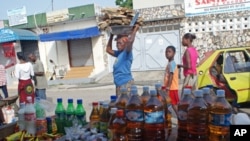A sense of normalcy is returning to Ivory Coast's main city of Abidjan after four months of post-election violence that terrorized residents.
Running water and electricity have been restored in many neighborhoods, residents have started coming out of their homes, and some shops and businesses have reopened their doors.
However, the Red Cross said Thursday that bodies still litter the streets in some areas.
Large numbers of security personnel continue to patrol the city, where food remains scarce and widespread looting is still taking place.
The World Food Program reported this week that its Abidjan warehouse had been completely emptied by looters, leaving tens of thousands of people without food aid. The agency said it cannot immediately replenish its supplies because the port remains closed and it is difficult to safely transport food on the ground.
The Ivory Coast crisis came to an end Monday, when forces backing elected President Alassane Ouattara captured his predecessor, Laurent Gbagbo, who had refused to give up power.
Gbagbo's refusal to step down after losing the November election sparked a power struggle that killed hundreds of people and displaced up to a million.
On Wednesday, Ouattara said his top priority is to restore security and normalcy to the country.
The Ouattara government says Gbagbo is under house arrest at a villa somewhere in Ivory Coast. Judicial proceedings have been launched against Gbagbo, his wife and close associates.
Ouattara has vowed to hold accountable all those who committed crimes during the post-election unrest.
Both pro-Gbagbo and pro-Ouattara forces have been accused of killing and raping civilians since the political crisis began in December.
Some information for this report was provided by AP and AFP.




